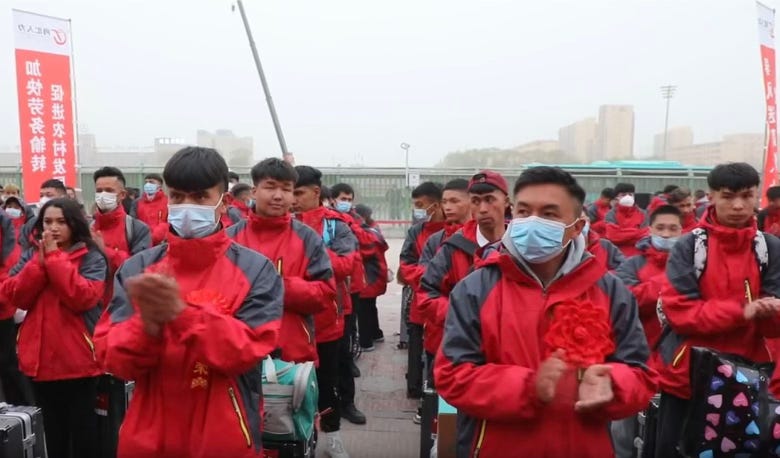Call for the U.K. Government To Halt British Import of Chinese Seafood Connected to Forced Labor
This week an NGO filed a legal petition to the British government, seeking formal sanctions against seven Chinese companies that were revealed by the ongoing Outlaw Ocean investigation as being tied to Uyghur forced labor.
The submission is the most recent development in an unusually global and collaborative journalistic effort. The petition was based on reporting and tools created by The Outlaw Ocean Project. But the more noteworthy element is how this reporting has been leveraged and amplified by more than 150 other news outlets in 40 countries and 17 languages. See the relevant tracking on this Reach page. Such collaboration in journalism is highly unusual and, in my view, it is a big reason for the sustained and international impact that the investigation is having.
This week’s legal petition was filed on March 4, 2024 under the United Kingdom’s Global Human Rights Sanctions (GHR) law. It calls on the U.K. Foreign, Commonwealth & Development Office to implement sanctions against seven Chinese companies that the OO investigation found to be complicit in serious human rights abuses committed against Uyghurs workers in China’s seafood industry.
Forced labor from China’s Xinjiang province is used extensively across the country’s seafood industry, which has repercussions for the global seafood industry because so many other countries rely on China’s processing capacity. Since 2018, at least a thousand Uyghurs have been forcefully relocated to work in seafood processing factories in Shandong province, one of the country’s most important fishing and seafood processing hubs. In turn, these factories supply hundreds of restaurants, grocers and food service companies in the United Kingdom, Canada, the United States, Europe and elsewhere. This includes ties to major U.K. importers like Lyons Seafoods, which produces branded and private label seafood for major U.K. retailers including Waitrose, Sainsbury’s, ASDA, and Tesco.
The seven Chinese companies cited in the sanctions recommendation include:
Yantai Sanko Fisheries (bait-to-plate, discussion);
Yantai Longwin Foods (bait-to-plate, discussion);
The Chishan Group, including its subsidiaries Shandong Haidu (bait-to-plate, discussion) and Rongcheng Haibo (bait-to-plate, discussion);
The Shandong Meijia Group, including its subsidiaries Rizhao Meijia Aquatic Foodstuff (bait-to-plate, discussion), Rizhao Jiayuan Foodstuff (bait-to-plate, discussion), and Rizhao Meijia Keyuan Foods (bait-to-plate, discussion);
Qingdao Tianyuan Aquatic Foodstuffs (bait-to-plate, discussion);
Rongsense Group, including its subsidiaries Rizhao Rirong Aquatic Products (bait-to-plate, discussion) and Rizhao Rongxing (bait-to-plate, discussion); and
Xinjiang Zhongtai Zhihui Modern Service (discussion).
The U.K. sanctions petition comes on the heels of similar such petitions filed elsewhere in the world.
The first such move happened in Canada on December 6, 2023. A legal petition was filed by the Uyghur Rights Advocacy Project and the Human Rights Action Group, two human rights advocacy organizations. Reporting on this submission can be found here and here.
A second legal petition was filed in the United States on January 11, 2024, with help from a team of lawyers at a human rights NGO that remained anonymous due to fears about repercussions from China. Reporting on this submission can be found here and here. Additionally, in November 2023, two other legal filings were submitted by NGOs calling on the U.S. Customs and Border Protection to to stop squid tied to Chinese distant water fishing vessels identified in an investigation from entering the country.
Next, in February 2024, a group of U.S. lawmakers co-signed a subsequent letter calling on the executive branch of the federal government to impose Global Magnitsky sanctions on the Chinese companies listed in the sanctions recommendation. Reporting on this letter can be found here and here.
The U.K.’s Global Human Rights Sanctions regime (GHR) allows the U.K. government to impose sanctions to deter and provide accountability for certain serious human rights violations or abuses around the world. It empowers the U.K. government to impose targeted sanctions on individuals or entities involved in these serious human rights violations or abuses. To date, the U.K. has used the Global Human Rights sanctions regime to sanction four Chinese government officials as well as the state-run Xinjiang security and policing body for systemic violation against Uyghurs and other minorities. You can find more information on the Global Human Rights sanctions regime here.
While there has been widespread repercussions in the United States in response to the investigation, the U.K. has been comparatively quiet on these matters. A few companies have severed ties with companies cited in these sanction recommendations. The former director of Human Rights Watch, Ken Roth, wrote in an op-ed published in the Guardian that the U.K. is lagging behind the U.S. on enforcement to restrict imports produced with Uyghur forced labor and needs to do more. These sanctions would be a step in the right direction.
The goal of these sanctions – according to human rights advocates – is to prevent U.K. companies and their associates from selling goods made with Uyghur forced labor. The loss of revenue for the perpetrators is also meant to pressure Chinese companies to stop using Uyghur forced labor, such advocates explain.
Aside from the legal petitions, there has also been growing pressure from American lawmakers aimed at various federal agencies, including NOAA, Homeland Security, and Customs and Border Patrol. A bipartisan group of American lawmakers requested closer scrutiny of seafood imports from China and the need to re-examine this supply chain. This includes calls for enhancing the screening of seafood coming from China; for expanded import monitoring to include all seafood coming into the country; for bans on imports from two Chinese provinces identified in the investigation as hubs of forced Uyghur and North Korean labor in seafood processing plants; and strengthening existing enforcement mechanisms already in place.
American lawmakers have also directed their attention at companies, having written, for example, letters to Sysco and Costco inquiring how they plan to ensure that future audits will adequately prevent seafood tied to Xinjiang and North Korean forced labor from entering the United States. A bipartisan commission created by the White House and Congress held a hearing in October 2023 to discuss the presence of seafood made with forced labor on Chinese ships and in China’s processing factories throughout the U.S. supply chain.
Out of respect from U.K. authorities, the petition letter is not public but it is based entirely on reporting that has already been made public. The British NGO that helped craft the legal petition has asked to remain anonymous due to concerns about repercussions from the Chinese government.
For more information about the Outlaw Ocean Project’s investigation into Uyghur forced labor in the Chinese seafood sector, please see the story about the use of Uyghur forced labor in the Chinese seafood processing sector; the video about the Chishan Group, one of the largest squid exporters to the United States, and its ties to forced labor from Xinjiang and forced labor on board fishing vessels; the Discussion page tied to the companies in the sanctions recommendation; and the Bait-to-Plate page tracing seafood from these companies to grocers in North America and Europe.
If you have any questions about this matter, please email us. (media@theoutlawocean.com). For routine updates on further reporting, please subscribe.





